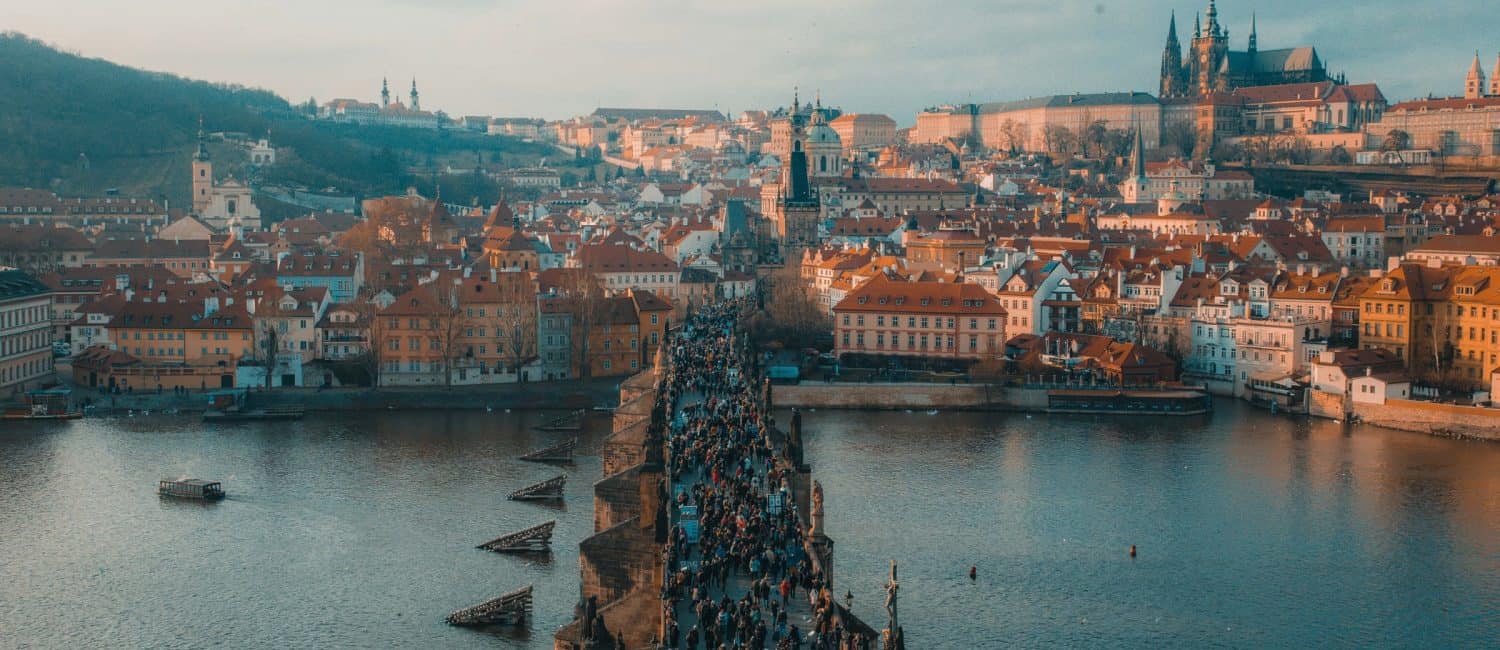Photo Credits: Anthony Delanoxi
Destinations around the world are preparing to reopen borders and Europe is no exception with countries easing pandemic restrictions and creating new ways to ensure tourist safety. This comes as a relief for travelers with the possibility of a summer holiday in Europe.
In order to adapt to the coronavirus crisis, relevant authorities have launched creative concepts such as “air bridges”, “travel bubbles”, and “holiday corridors between countries that did not require quarantine for visitors. Furthermore, governments, international institutions, and specialized tourism organizations are surging with new initiatives and protocols first to permit the resumption of cross-border vacation travel and then, in a few weeks, of international travel in time for the peak summer season.
According to the European Best Destination Organisation (EBD), under the European Commission’s EDEN Network (“European Destinations of Excellence”), the continent is working towards promoting sustainable tourism and reopening borders, flights, and hotels. Furthermore, the EBD has unveiled a list of 20 destinations least affected by Covid-19 (defined as up to 600 times fewer Covid-19 cases), a guide for travelers explaining the safety measures that are being taken in countries and regions.
The unveiled destinations benefit from proximity to hospitals and have a higher number of hospital beds per inhabitant compared to the majority of European countries. They also have implemented specific hygiene protocols in accommodations, restaurants, and shops, like air conditioning filter change between each traveler, mask availability, and social distancing.
The EBD prior travel recommendations include;
- Remain vigilant by maintaining barrier gestures, social distancing, and wear masks when possible and necessary.
- Avoid traveling in poor health.
- Travelers who are over 70, overweight, or with respiratory problems must be extra vigilant.
- It is travelers’ responsibility to protect their most fragile loved ones and residents of host countries
1. Tbilisi, Georgia
Tbilisi, the capital of Georgia, has been one of the least affected in the world by coronavirus. Their quick response with restrictions has kept the effects of the epidemic at an extremely low level. There are up to 260 times fewer cases of Covid-19 in Georgia than in the most affected European countries.
The country is implementing health measures to protect travelers and its citizens for safe tourism before reopening its borders in July.
Tbilisi is more trendy than ever in 2020 making it an ideal destination for culture, gastronomy, diversity, and architecture lovers. Magnificent Haussmannian buildings mingle with architecture dating from the Middle Ages, neo-classical, Soviet, and extremely modern.
The city offers a wide range of accommodations starting from tourist apartments, boutique hotels, and guesthouses, with a 5-star hotel or private villa stay which costs four times less than in the same hotel of the same group in another European capital.
2. Corfu, Greece
Corfu, a paradisiacal combination of relaxation, sun, and nature, is the perfect destination to recharge after the lockdown stress. Greece has up to 50 times fewer people infected than in the most affected European countries.
The country has more hospital beds per capita eliminating any overload to the Greek healthcare system during the pandemic. Greece borders are also planned to reopen in July.
3. Cavtat, Croatia
Cavtat is popular among celebrities and travelers who love gastronomy, culture, nature, and water sports.
Croatia is among the European countries least affected by the virus with up to 20 times fewer infected people per million inhabitants than in any other European country. It is one of the highest numbers of hospital beds per inhabitant, and Dubrovnik hospital is a 20-minute drive from Cavtat while the airport is only 10 minutes away.
The city has a large selection of private villas, tourist apartments, and small family hotels.
Croatia has implemented hygienic and sanitary measures in larger hotels and reopening its borders in July.
4. Azores Islands
The Azores Islands in the middle of the Atlantic Ocean is an archipelago of nine islands showing off nature in its purest state and one of the largest whale sanctuaries.
This is the perfect destination to reconnect with nature with its purest state and one of the largest whale sanctuaries.
The Azores have an ample offer of private villas, tourist apartments, and small family hotels and is reopening its borders in July without quarantine.
5. Preveza, Greece
Situated at the mouth of the Ambracian Gulf, with the Ionian Sea on the other side, Preveza is “an island on the mainland” in Epiruswill, northwestern Greece. It has countless beaches, Mediterranean cuisine, a yacht-filled marina, Preveza appears fifth on the list of Europe’s safest vacation spots.
Preveza is surrounded by three hospitals located 10 minutes by car from Aktion Airport. Greece has more hospital beds per capita than the United Kingdom or Canada.
The country reopens in July with no quarantine request.
6. Alentejo, Portugal
Portugal is also included in one of the least effect countries of coronavirus with up to 40 times fewer people infected than anywhere else in Europe.
The Alentejo in Southern Portugal is one and half an hour by car from Lisbon, attracts travelers searching for simplicity in unspoiled nature.
The country reopens in July with no quarantine request.
7. Batumi, Adjara, Georgia
Georgia is one of the least affected countries with quick measurements taken resulting extremely low level of cases, with 260 times fewer cases of Covid-19.
Batumi, located on the coast of the Black Sea, at the foot of the Caucasus in Southwestern Georgia, is the capital of the Autonomous Republic of Adjara and the second-largest city in the country. It has a splendid mix of beautiful scenery, vibrant culture, and legendary hospitality with a contrast of historic ancient sites as well as its modern lifestyle. It is also is one of the most secure, with a crime rate up to five times lower than most European capitals.
The city has more than 30 hospitals, including university hospitals which overcrowding during a health crisis.
The country reopens in July with no quarantine request.
8. Zagreb, Croatia
Zagred is the capital and the largest city in the country, located in the northwest along the Sava River, at the foot of the southern slopes of Medvednica Mountain. It has also a rich history dating from Roman times.
Croatia has up to 20 times fewer infected people than in any other European country, with well-equipped healthcare and more hospital beds per inhabitant than most European countries.
The country reopens in July with no quarantine request.
9. Algarve, Portugal
The Algarve is the southernmost region of continental Portugal and particularly appreciated by families. Sandy long stretches of beaches framed by golden cliffs, small coves sheltered by the rocks, the ocean in every shade of blue, and mostly calm and warm.
The city’s 60% of tourist accommodations consist of private villas with swimming pools, apartments, guesthouses or small hotels. Their tourist officials have implemented 60% of Algarve tourist accommodations consist of private villas with swimming pools, apartments, guesthouses or small hotels.
The country reopens in July with no quarantine request.
10. Sibiu, Romania
Sibiu is a historical city in Transylvania, Northwest of Bucharest, the capital of Romania. It is a well-known tourist destination for both domestic and foreign visitors, for its culture, history, gastronomy, diverse architecture.
Sibiu has developed many green spaces in the city but also soft mobility, leisure spaces, and parks, and is regarded as one of Europe’s destinations with the best quality of life. It is committed to sustainable tourism development based on respect for nature and human beings.
There were 15 times fewer Covid-19 cases in Romania than in the most affected European countries. Some destinations like Sibiu County have had no deaths linked to the pandemic. It has There were 15 times fewer Covid-19 cases in Romania than in the most affected European countries. Some destinations like Sibiu County have had no deaths linked to the pandemic.
The country is reopening its borders in July.
11. Kotor, Montenegro
The old Mediterranean port of Kotor is surrounded by fortifications built during the Venetian period in what’s considered one of the most indented parts of the Adriatic Sea. Some have called it the southernmost fjord in Europe, but it’s a submerged river canyon.
Montenegro has more available hospital beds per capita than Norway, Ireland, and Canada, and Kotor has remained a green zone during the crisis with no case of coronavirus detected.
The country is reopening its borders in July.
12. Rijeka, Crotia
The principal seaport and the third-largest city in Croatia, it is located in Primorje-Gorski Kotar County on Kvarner Bay, an inlet of the Adriatic Sea.
Rijeka is a perfect destination for a safe European trip. It likely will be one of the top destinations this summer. “Croatians love the coffee terraces and the many beaches with crystal clear waters around Rijeka.
The country is reopening its borders in July.
13. Warsaw, Poland
The capital and largest city of Poland, Warsaw is an alpha global city, a major international tourist destination, a significant cultural, political and economic hub.
Poland is one of the European countries least affected by COVID-19, along with Portugal and Greece. There are up to 20 times less contamination than in the most-affected countries of Western Europe. No hospital has ever been overwhelmed and Poland has more hospital beds per inhabitant than the Netherlands or Switzerland.
The country is reopening its borders in July, with no quarantine required.
14. Vienna, Austria
Vienna is visited by history buffs, lovers, and families looking for a safe and peaceful destination throughout the year.
Austria has been less affected by COVID-19 than other European countries, with up to 10 times fewer infected people.
Reopening to travelers from July 1. Before that date, a health certificate is required on entry, stating that the traveler is not infected.
15. Bohinj, Slovenia
Bohinj is located in a basin in the Julian Alps in the Upper Carniola region of northwestern Slovenia, it is known as one of the “green paradises of Europe” and the green lung of Slovenia.
Slovenia is effected 10 times less contaminated than the most-affected countries) and it has more hospital beds per inhabitant than the majority of European countries. Bohinj is only 40 minutes from Ljubljana’s airport and hospitals.
The country reopens in July with no quarantine request.
16. Malta
Tourism on the island of Malta represents 15% of the nation’s gross domestic product. It has turquoise water of the Mediterranean Sea, with a rich history and cultural heritage.
There have been up to 55 times fewer cases of coronavirus in Malta than in the most-affected European countries. Malta has more hospital beds per resident than Finland, Ireland, or the United Kingdom and its hospitals have not been overcrowded and can accommodate travelers, if necessary.
Hotels reopen on June 1, while the tourist season restarts on July 1st.
17. Gdansk, Poland
Gdansk is located on the southern edge of Gdańsk Bay on the Baltic Sea, is one of its tourist pearls. This coastal city also bears the pretty nickname of “Pearl of the Baltic.”The city is a rare beauty with a 1,000-year-old historic district.
Poland was 20 times less affected than other European countries and has more hospital beds per inhabitant than the majority. Moreover, sanitary measures have been implemented to welcome travelers in hotels, restaurants, and shops.
The country reopens in July with no quarantine request.
18. Vilnius, Lithuania
Vilnius is the capital and the largest city in the country and is located in southeastern Lithuania.
With 20 times fewer people infected by coronavirus than in the most-affected European countries, Lithuania also has a high average of hospital beds per inhabitant. (Only Germany and Austria do better in Europe)
The country reopens in July with no quarantine request..
19. Riga, Latvia
Riga has 800-years of turbulent history, from German Knights to Swedish Kings and Soviet Commissars, who have left their footprints in the cultural heritage of the city.
Latvia’s capital is an exciting European metropolis at the crossroads of eastern and northern Europe.
With 50 times fewer infected people than in some European countries, Latvia is one of the destinations least affected by this pandemic. Their hospitals have not been overwhelmed due to the coronavirus.
The country reopens in July with no quarantine request.
20. Wild Taiga, Finland
The ultimate escape: In the heart of Finland’s eastern Kainuu nature reserve, Wild Taiga with its woods, untouched land, clear lakes, and rapids is an invitation to authentic natural experiences and a rare opportunity to hike in unspoiled nature, watch and photograph wildlife and enjoy cultural activities.
With 15 times fewer Covid-19 cases than in some European countries, Finland is one of the destinations least affected by this pandemic.
The country reopens in July with no quarantine request.




